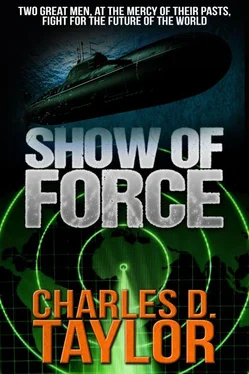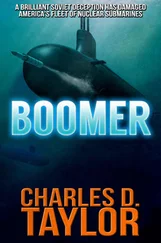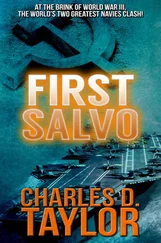"Pretty stubborn, huh?"
"Pretty stubborn," David agreed. He pointed to the chair next to him. "Hop up for a minute, Tom. Make yourself comfortable."
Loomis settled into the offered chair, saying nothing, waiting for David to talk as he knew the Admiral wanted to. Finally, Charles said, "I sometimes wonder, Tom, why the hell any of us make a career in the military." The chaplain knew he wasn't finished. "You know, we all talk about preserving the peace, which is very honorable in time of peace. But I don't feel I'm preserving anything right now except some goddamn island that some goddamn politicians have decided is very important." He looked at the other man. "Do you know how many men we've lost?"
"Too many."
"Right. Too many. I guess somewhere between fifteen hundred and two thousand already. And that doesn't account for all those Alex has lost."
"Alex?"
"Admiral Alexander Kupinsky, commander of the Russian force, Tom. An acquaintance of mine, you might say, a very good one, as a matter of fact. We knew each other in London not so long ago." He went on to relate parts of the story of those happier days when they had found affection for each other in the similarities and the strangeness of their backgrounds. David kept the story short, answering a few of Loomis's questions that were intended to draw him out, talking as the other man knew he must before the next engagement.
"Admiral." It was Bill Dailey interrupting his monologue. "I've just about completed the orders for the task force, sir. We're ready to hold down their subs, but I have a couple of things that just can't wait."
"No problem, Bill. We were just trading lies here." He looked over to the chaplain. "Got to get back to work, Tom. Duty calls," he added with a grin.
As he made his way to the ladder at the rear of the bridge, he turned back. "And thanks for the small talk. Stop by again when you're making the rounds." The chaplain waved in acknowledgment and smiled. "And you'd better get off your rump there, Tom. There's a lot of souls need saving this morning. And how about playing "The Navy Hymn' over the circuit after you give your pitch to the troops. That's always been one of my favorites."
Alex Kupinsky was in a familiar place, leaning on the railing near the rear of the open bridge, when Svedrov came up to him. "Something very unusual, Admiral. The Americans are using one of their tactical frequencies for some type of speech. Our interpreters do not understand exactly its purpose."
Kupinsky moved toward the front of the bridge wing and gestured to a radio speaker near his chair. "Patch it in there." Svedrov saluted and was gone.
A few moments later the speaker suddenly blared through the quiet with a too-loud American voice. He turned it down in an attempt to make out the words, but they had stopped. As Svedrov returned to the bridge, the music began its slow cadence. He looked at his Admiral, shaking his head in bewilderment.
It was "The Navy Hymn."
FROM THE LOG OF ADMIRAL DAVID CHARLES
When I was in plot early this morning, there were so many notes I wanted to write down for this log. Now I know it's not necessary. The history books will take care of that. They don't need my scratchings. I wonder what they will call what's happening here. Will it be the Battle of the Indian Ocean or the Battle of Islas Piedras? We have seen the ocean, but I don't think anyone on either side has seen that goddamn pile of guano that caused all of this. Will they lump all the fleet actions together, or will they separate the individual segments? I'd call this the third battle myself, although this day's just starting. We're going to meet head on in a few hours, and then will that be the fourth battle or part of the third?
What have I learned from this confrontation? Maybe that's what I'll want to look back on most, or tell my grandchildren sometime. What I know without having to be told is that I'm chasing around the Indian Ocean on the foremost target, the Nimitz. Gorenko wants this ship because once our air-strike capability is gone, that island will be theirs if they have to squander ships in vast numbers to get it. Never before at sea has the awesome power of the air strike been so evident to me. And never before have I realized that we have a huge problem with just one giant carrier when the stakes are so high. If I had the chance to do it all over, I'd want half a dozen little carriers all over the ocean, fast little jobs that could get their air groups close enough to the enemy to strike from one direction while another carrier did it from the opposite side. And if we lost one, or two, or even three of those bird farms to the enemy, we'd still have more to throw back at them.
That, I think, is what we need the most. And we have to develop those VTOL planes like the Russians have. If we only have so much money to spend on ships, we need little dual-purpose carriers with planes that don't need much space for takeoff or landing. Then we wouldn't mind the expense so much if they get used for antisubmarine purposes one time and this type of battle the next. They'd never dream of using Nimitz for ASW after the bundle they dropped on this ship.
And since these carriers can't protect themselves from missile attack very well, I'd just as soon have a bunch of those little frigates chasing around me, as long as they had plenty of antimissile gear on them. I used to think that offensive power on these little ships was so important, but now I think I want to have defense instead and project all my power with carrier aircraft.
All the missiles are carrying a bigger bang than ever before. When a ship is hit, especially a little one, I think that may be it for them, more often than not. So maybe they don't need that expensive engineering plant after all. If they've got to be expendable like they've been in the past, then why spend too much money on engines and double screws when the first hit will probably be the last. They're not — going to steam back for repairs like they did forty years ago.
Alex isn't going to win. I don't know if we are either, but he's not going to get that island. There are more of them than us, but he doesn't have the carrier strike that he needs. His ships are bristling with weapons, too, but that fierce look doesn't do a hell of a lot of good if they aren't as reliable as ours. I think that's another place I may have Alex beaten. Our technology is supposed to be more reliable, and if it is, we'll hold out.
After everything that's happened this morning, I should be able to write a book, but I know Bill Dailey needs me now and I feel so tired.
MY DEAREST DAVID,
I know I wrote you only yesterday, and that it's very unlike me to worry about you or even to write more than once a week. But I know something is desperately wrong and you may need these letters very much. I called Ann Carter today, and she was strangely quiet. Sam had never come back after he had left from dinner here the other night, and she says he has returned only one of her calls and was very abrupt even then. I've noticed other little things, too. Last night, when I was coming home from Bobbie Collier's (and she is sure something's up), I noticed that a lot of military cars were not in the driveways where they belong at that hour. I'm sure they're all at the Pentagon working late, or not planning to come home at all.
I might be getting too old for these Cold War crises, but I looked in the mirror the other day, and the face didn't look too ancient to me. So maybe I'm not imagining things after all. And by the way, I heard on the morning news that the White House is tighter than a drum since yesterday afternoon. I guess all of this meandering of mine keeps coming back to the same point — I worry about you these days. I'd always thought admirals kept to their desks and stayed out of trouble, but I have this horrible feeling you're steaming right into it like you used to. Please remember, admirals aren't intended to go in harm's way. I don't remember who used that phrase before, but the statement about admirals is purely mine.
Читать дальше












